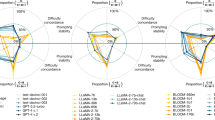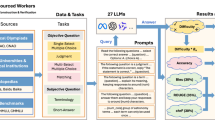Abstract
Using prompt-engineering and retrieval augmented generation, we can leverage pre-trained Large Language Models to answer domain-specific questions relying on information from textual sources. In this work, we discuss how to assess the trustworthiness of a module that performs such task: how to build a large, representative, and unbiased dataset of questions/answers by automatically generating variations and which metrics to compute. We apply the methodology to a use-case where a smart wheelchair provides answers about its functioning, presenting experimental results on a dataset of more than 1000 questions.
Access this chapter
Tax calculation will be finalised at checkout
Purchases are for personal use only
Similar content being viewed by others
Notes
- 1.
- 2.
- 3.
Available at https://github.com/SandraMNE/TWALLM
- 4.
- 5.
- 6.
- 7.
- 8.
- 9.
References
Damodaran, P.: Parrot: paraphrase generation for NLU. (2021)
Es, S., James, J., Espinosa Anke, L., Schockaert, S.: RAGAs: automated evaluation of retrieval augmented generation. In: Proceedings of the 18th Conference of the European Chapter of the Association for Computational Linguistics: System Demonstrations, pp. 150–158 (2024)
Jang, M., Lukasiewicz, T.: Consistency analysis of ChatGPT. arXiv preprint arXiv:2303.06273 (2023)
Johnson, D., et al.: Assessing the accuracy and reliability of AI-generated medical responses: an evaluation of the Chat-GPT model. Res Sq [Preprint]. 28 Feb 2023. rs.3.rs-2566942. https://doi.org/10.21203/rs.3.rs-2566942/v1. PMID: 36909565; PMCID: PMC10002821
Jungiewicz, M., Smywiński-Pohl, A.: Towards textual data augmentation for neural networks: synonyms and maximum loss. Comput. Sci. 20, 57–83 (2019)
Kale, M., Rastogi, A.: Text-to-text pre-training for data-to-text tasks. In: Proceedings of the 13th International Conference on Natural Language Generation, pp. 97–102. Association for Computational Linguistics (2020)
Khatun, A., Brown, D.G.: Reliability check: an analysis of GPT-3’s response to sensitive topics and prompt wording. arXiv preprint arXiv:2306.06199 (2023)
Lewis, P., et al.: Retrieval-augmented generation for knowledge-intensive NLP tasks. In: Advances in Neural Information Processing Systems, vol. 33, pp. 9459–9474 (2020)
Li, J., et al.: Are you asking GPT-4 medical questions properly?-prompt engineering in consistency and reliability with evidence-based guidelines for ChatGPT-4: A pilot study. npj Digit. Med. 7, 41 (2023)
Liu, Y., et al.: Trustworthy LLMs: a survey and guideline for evaluating large language models’ alignment. arXiv preprint arXiv:2308.05374 (2023)
Sennrich, R., Haddow, B., Birch, A.: Improving neural machine translation models with monolingual data. arXiv preprint arXiv:1511.06709 (2015)
Shen, X., Chen, Z., Backes, M., Zhang, Y.: In ChatGPT we trust? measuring and characterizing the reliability of ChatGPT. arXiv preprint arXiv:2304.08979 (2023)
Si, C., et al.: Prompting GPT-3 to be reliable. arXiv preprint arXiv:2210.09150 (2022)
Silva, A., Schrum, M., Hedlund-Botti, E., Gopalan, N., Gombolay, M.: Explainable artificial intelligence: evaluating the objective and subjective impacts of XAI on human-agent interaction. Int. J. Hum. Comput. Interact. 39(7), 1390–1404 (2023)
Suárez, A., et al.: Unveiling the ChatGPT phenomenon: evaluating the consistency and accuracy of endodontic question answers. Int. Endod. J. 57(1), 108–113 (2024)
Wang, W.Y., Yang, D.: That’s so annoying!!!: a lexical and frame-semantic embedding based data augmentation approach to automatic categorization of annoying behaviors using# petpeeve tweets. In: Proceedings of the 2015 Conference on Empirical Methods in Natural Language Processing, pp. 2557–2563 (2015)
Zhang, J., Zhao, Y., Saleh, M., Liu, P.J.: PEGASUS: pre-training with extracted gap-sentences for abstractive summarization. arXiv:1912.08777 (2019)
Zhang, X., Zhao, J., LeCun, Y.: Character-level convolutional networks for text classification. In: Advances in Neural Information Processing Systems, vol. 28 (2015)
Zhong, L., Wang, Z.: A study on robustness and reliability of large language model code generation. arXiv preprint arXiv:2308.10335 (2023)
Acknowledgments
This work was supported in part by REXASI-PRO H-EU project, call HORIZON-CL4-2021-HUMAN-01-01, Grant agreement no. 101070028. (Funded by the European Union. Views and opinions expressed are however those of the author(s) only and do not necessarily reflect those of the European Union or the European Research Executive Agency. Neither the European Union nor the granting authority can be held responsible for them.)
Author information
Authors and Affiliations
Corresponding author
Editor information
Editors and Affiliations
Ethics declarations
Disclosure of Interests
The authors have no competing interests to declare that are relevant to the content of this article.
Rights and permissions
Copyright information
© 2025 The Author(s), under exclusive license to Springer Nature Switzerland AG
About this paper
Cite this paper
Mitrović, S., Mazzola, M., Larcher, R., Guzzi, J. (2025). Assessing the Trustworthiness of Large Language Models on Domain-Specific Questions. In: Santos, M.F., Machado, J., Novais, P., Cortez, P., Moreira, P.M. (eds) Progress in Artificial Intelligence. EPIA 2024. Lecture Notes in Computer Science(), vol 14969. Springer, Cham. https://doi.org/10.1007/978-3-031-73503-5_25
Download citation
DOI: https://doi.org/10.1007/978-3-031-73503-5_25
Published:
Publisher Name: Springer, Cham
Print ISBN: 978-3-031-73502-8
Online ISBN: 978-3-031-73503-5
eBook Packages: Computer ScienceComputer Science (R0)




